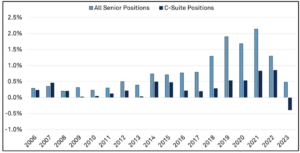Content Highlights
In a recent report by S&P Global Market Intelligence, a disconcerting trend emerges: women are losing ground in upper-level leadership positions within corporate America. This decline marks a significant setback in the journey towards gender parity, highlighting the challenges women face in advancing their careers.
At Gardner Employment Law, we understand the importance of fostering diversity and the challenges that women face in advancing their careers and advocating gender parity. We’re in your corner.
Is Gender Parity in Corporate Leadership Slipping Away?
Women are losing ground in Corporate American management. This graph shows women’s corporate leadership growth year-to-year.

Figure 1 – S&P Global Total Market Index
The S&P report and Figure 1 illustrate a troubling reality: The growth rate in women’s representation in corporate high-level positions has slowed significantly. The last year increased a mere 0.5% compared to the historical average of 1.2.% in the growth rate of female leaders. This decline is particularly alarming as it deviates from the exponential growth seen in previous years.
Moreover, the report reveals a concerning decline in women’s representation in C-Suite positions, with women losing seats for the first time between 2005 and 2023. Despite efforts to promote gender diversity, the percentage of women holding C-suite positions has regressed, raising doubts about the trajectory of gender parity in corporate leadership. These projections suggest that gender parity in leadership positions within U.S. firms may not be achieved until 2033 to 2042. Compare this to the previous estimate of reaching parity in 2022. Urgent action is needed to address this downward trend. The apparent waning focus on diversity and inclusion initiatives within corporate organizations further compounds the issue. Publicly traded firms spend less time discussing these crucial topics necessary to keep the focus on increasing the number of women in leadership roles.
To cultivate and build a corporate culture that is more welcoming to women’s promotions, organizations can implement the following strategies:
-
- Prioritize and invest money and time in initiatives that support women’s advancement and leadership development.
- Recognize and leverage the value of diverse leadership teams that will drive innovation and success.
- Implement strategies to address systemic barriers and biases that hinder women’s progress.
- Foster inclusive leadership practices that empower women to thrive and contribute.
Addressing the decline in gender parity in corporate leadership requires a concerted effort by organizations across all sectors. Gender parity in corporate leadership is not just about meeting quotas or ticking boxes—it’s about creating a culture of equity, respect, and opportunity for both men and women.
Women Representation in the Healthcare Leadership
In the realm of healthcare, gender parity remains elusive, with women comprising 70% of the workforce but holding a mere 25% of upper level roles. A deeper look reveals a stark gender disparity in leadership positions – men still predominantly occupy a large majority of top roles in health organizations.
The statistics paint a concerning picture: 69% of global health organizations and 80% of board chairs are male-led. Shockingly, only 20% of these organizations achieve gender parity on their boards, and a mere 25% maintain gender balance at management level.
As evidenced by the lack of women filling high-level roles, the gender disparities that are pervasive in corporate healthcare is not an isolated phenomena. As women encounter barriers to advancement and leadership within healthcare companies, similar challenges reverberate across various industries, including corporate sectors.
What Are the Forces Preventing Women from Progressing to Leadership Roles?
The WHO, the Global Health Workforce Network, and Women in Global Health have identified the following forces holding women back:
- Underrepresentation in Leadership: Despite comprising the majority of the healthcare workforce, women face barriers to top positions because of stereotypes, discrimination, and power imbalances.
- Impact of Gender Norms: Cultural stereotypes restrict women’s roles in the higher ranks, hindering their advancement to leadership positions and widening the gender pay gap.
- Challenges and Discrimination: Women encounter bias, discrimination, and harassment which impedes their career growth and morale.
- Inadequate legal and social protections: In this country, society itself still accepts that males “should” occupy the highest positions in all industries. This complacency in turn fails to drive needed change to make progress in increasing the numbers of women in leadership positions.
- Threat to Health Delivery: Gender inequality jeopardizes health services, with an estimated shortage of 18 million health workers by 2030. Achieving gender balance requires targeted action. Waiting for natural progress could take centuries.
Addressing gender parity in healthcare leadership is not just about rectifying an industry-specific imbalance. Because those working in healthcare touch everyone in society, promoting women in healthcare opens a path towards dismantling systemic barriers that impede women’s advancement across all sectors. The very process of patients seeing more women excel in healthcare can encourage broader societal shifts towards gender equality throughout all industries.
Indra Nooyi: A Woman Trailblazer in Corporate Leadership
Indra Nooyi, the former CEO of PepsiCo, stands as a beacon of inspiration for women aiming to break through the glass ceiling in corporate America. Nooyi’s journey from humble beginnings in India to leading one of the world’s largest food and beverage companies exemplifies resilience, determination, and visionary leadership. Throughout her career at PepsiCo, Nooyi drove substantial growth and innovation, diversified the company’s product portfolio, and spearheaded sustainability initiatives. Her strategic vision and unwavering commitment to corporate social responsibility transformed PepsiCo into a global powerhouse.
Nooyi’s impact extends beyond success in the management setting. She has advocated for gender diversity and inclusion at all levels in the workplace, paving the way for future generations of women leaders. Her leadership style, characterized by humility, empathy, and foresight, has earned her widespread acclaim and recognition, including being named among Forbes’ list of the most powerful women in the world.
Nooyi’s story serves as a testament to the immense potential of women in corporate leadership roles. Her example underscores the importance of creating environments that encourage and empower women to thrive.
Contact an Expert
At Gardner Employment Law, a woman-owned law firm, we understand the importance of female representation in senior corporate positions. Contact us today to learn about building a more equitable and supportive work environment for women.

